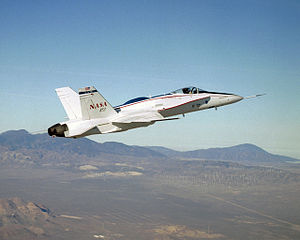Boeing X-53 Active Aeroelastic Wing


Program pengembangan X-53 Active Aeroelastic Wing (AAW)' merupakan proyek penelitian yang selesai dilakukan bersama oleh Air Force Research Laboratory (AFRL), Boeing Phantom Works dan NASA's Dryden Flight Research Center, di mana teknologi tersebut merupakan penerbangan uji pada modifikasi McDonnell Douglas F/A-18 Hornet. Aeroelastik Teknologi Wing aktif adalah teknologi yang mengintegrasikan aerodinamis sayap, kontrol, dan struktur untuk memanfaatkan dan mengendalikan sentuhan aeroelastik sayap dengan kecepatan tinggi dan tekanan dinamis.
Spesifikasi[sunting | sunting sumber]
Karakteristik umum[sunting | sunting sumber]
- Kru: 1
- Lebar sayap: 38 ft 5 in (11,71 m)
- Tinggi: 15 ft 3 in (4,65 m)
- Max berat lepas landas: £ 39.000 (17.690 kg)
- Powerplant: 2 × General Electric F404-GE-400 turbofan mesin rendah-bypass, 16.000 lbf (71 kN) dorong masing-masing
Prestasi[sunting | sunting sumber]
- Kecepatan maksimum: 1.032 kn, 1.912 km / h (1.188 mph)
- Layanan langit-langit: 50.000 ft (15.000 m)
Referensi[sunting | sunting sumber]
- Miller, G.D., "Active Flexible Wing (AFW) Technology," Air Force Wright Aeronautical Laboratories TR-87-3096, February, 1988.
- Miller, G.D., "AFW Design Methodology Study", Rockwell-Aerospace Report No. NA 94-1731, December 1994.
- Pendleton, E., Griffin, K., Kehoe, M., and Perry, B., "A Flight Research Program for Active Aeroelastic Wing Technology," Paper 96-1574, Proceedings of the 37th AIAA Structures, Structural Dynamics, and Materials Conference, Salt Lake City, Utah, 15–17 April 1996.
- Zillmer, S., "Integrated Multidisciplinary Optimization for Aeroelastic Wing Design,” Wright Laboratory TR-97-3087, August, 1997.
- Zillmer, S., "Integrated Structure / Maneuver Design Procedure for Active Aeroelastic Wings, User’s Manual,” Wright Laboratory TR-97-3087, March, 1997.
- Pendleton, E., Bessette, D., Field P., Miller, G., and Griffin, K., "Active Aeroelastic Wing Flight Research Program: Technical Program & Model Analytical Development," Journal of Aircraft, Volume 37, Number 4, July–August, 2000.
- Pendleton, E., " Active Aeroelastic Wing,” AFRL Technology Horizons, Selected Science and Technology Articles, Vol. 1, No. 2, June 2000.
- Pendleton, E., "How Active Aeroelastic Wings are a Return to Aviation’s Beginning and a Small Step to Future Bird-like Wings," Invited Paper, Japan Society of Aeronautical and Space Sciences Aircraft Symposium, Sendai, Japan, October 11, 2000.
- The Boeing Company, “The Active Aeroelastic Wing Flight Research Program (The X-53) Final Report”, Volume 1 and II, AFRL-VA-WP-TR-2005-3082, October, 2005.
- Pendleton, E., Flick, P., Voracek, D., Reichenbach, E., Griffin, K., Paul, D.,“The X-53,A Summary of the Active Aeroelastic Wing Flight Research Program,” Paper 07-1855, Proceedings of the 48th AIAA Structures, Structural Dynamics, and Materials Conference, Honolulu, Hawaii, April 23–26, 2007.
Wikimedia Commons memiliki media mengenai Boeing X-53.
- Technology that enables wing 'warping' rolled out at Dryden, Boeing
- Boeing Active Aeroelastic Wing page
- AAW NASA gallery Diarsipkan 2006-08-04 di Wayback Machine.
